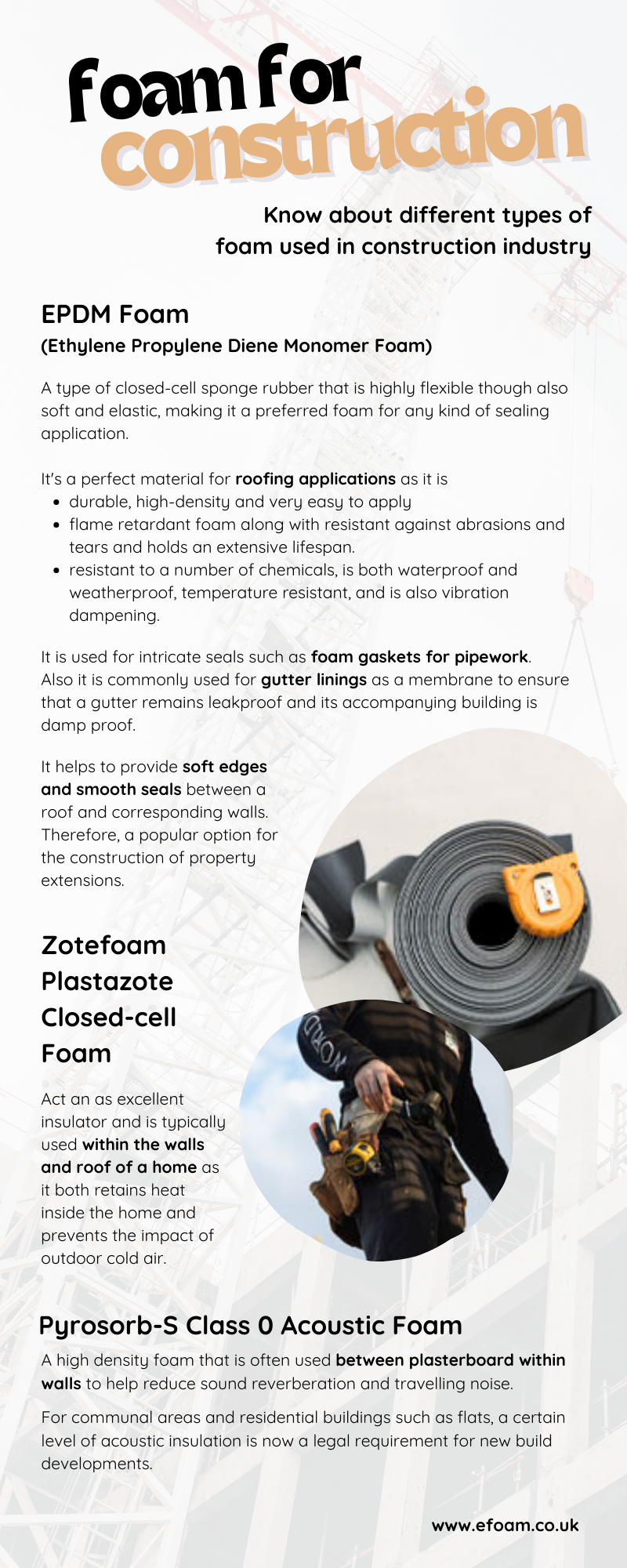
Foam for Construction

There are numerous uses for foam in the construction industry, mainly due to its wide range of properties. Foam is lightweight and durable, and many types of foam have specialist sealing and thermal insulation qualities. For example, standard polyurethane foam is available in various densities and naturally comes with a wide array of applications. When ordered via eFoam, this can be done to any custom shape, size and density via our cut to size tool.
One of the most popular types of foam in the construction industry is EPDM foam, also known as ethylene propylene diene monomer foam. A type of closed-cell sponge rubber, this foam is highly flexible though also soft and elastic, making it a preferred foam for any kind of sealing application. Naturally, EPDM foam is often the material of choice for roofing applications – because it is durable, high-density and very easy to apply.
EPDM is also a flame retardant foam; it is also resistant against abrasions and tears and holds an extensive lifespan. It is resistant to a number of chemicals, is both waterproof and weatherproof, temperature resistant, and is also vibration dampening. Given its excellent resistance to sunlight, it is the foam material of choice for flat and other types of low-pitched roofing, where durability is vital. It is a type of foam that is unmatched in terms of weather resistance as it can withstand ever-changing conditions, ranging from extreme heat to cold, and the effects of ozone, air pollution and UV rays.

For more specialist applications in the construction sector, EPDM foam can also be used for intricate seals such as foam gaskets for pipework. Likewise, it is also commonly used for gutter linings as a membrane to ensure that a gutter remains leakproof and its accompanying building is damp proof. EPDM foam is a material that helps to provide soft edges and smooth seals between a roof and corresponding walls. It is also, therefore, a popular option for the construction of property extensions.
However, EPDM is not the only option available if you are looking for construction foam. High-density polyethylene foam is an excellent insulator and is typically used within the walls and roof of a home. Zotefoam Plastazote closed-cell foam is a foam we highly recommend for this type of insulation as it both retains heat inside the home and prevents the impact of outdoor cold air. Likewise, it is highly customisable and easily shaped for specific areas of the house, no matter how obscure! For modern, energy-efficient homes, this type of foam insulation is typically standard in present construction.
Other foams used in the construction sector include types of acoustic foam, such as Pyrosorb-S class 0 acoustic foam. This foam is high density and often used between plasterboard within walls to help reduce sound reverberation and travelling noise. For communal areas and residential buildings such as flats, a certain level of acoustic insulation is now a legal requirement for new build developments.
Industry Stats
The Polyurethane Foam Market is projected to grow from USD 49.5 billion in 2023 to USD 67.8 billion by 2028, at a CAGR of 6.5% from 2023 to 2028.
Polyurethane foam is a popular choice for various construction applications due to its ability to provide superior thermal insulation and energy efficiency. It effectively seals gaps and prevents air leakage, making buildings more energy-efficient and environmentally friendly.
Source: https://www.linkedin.com/pulse/polyurethane-foam-trends-applications-advantages-key-danny-sharma
The EPDM market size is estimated to be USD 3.9 billion in 2023, and it is projected to reach USD 5.2 billion by 2028 at a CAGR of 5.9%. One of the key factors expected to propel the growth of the EPDM market is the increasing usage of EPDM in automotive and construction & building application areas.
Source: https://www.marketsandmarkets.com/Market-Reports/epdm-rubber-market-483.html
Please contact us if you require any personal guidance or more detailed information on how eFoam can supply you with the required foam materials for your construction project.


